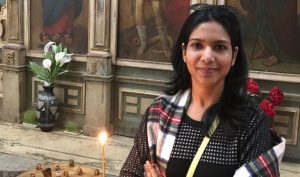Richa is a part-time distance learning student on the department’s MSc Applied Linguistics for Langugae Teaching programme. Richa teaches Business English and academic writing to undergraduate students at a University in Dubai alongside her studies. Before starting her MSc, she studied English Literature, Philosophy and Political Science for her Bachelor’s degree at Mohanlal Sukhadia University in India.
What degree did you apply for and why was it important to you to study this?
I applied for MSc ALLT because I felt that it would provide me an opportunity to study applied linguistics for language teaching in a more systematic and rigorous style.
Having taught English in India for several years, I moved to the UAE where I started teaching undergraduate students from ten different Asian and middle eastern countries. I believed that this programme would improve my understanding of individual differences among my students and would help me tailor learning materials to match their needs and preferences.
What do you hope to go on to do once you’ve completed your degree?
I plan to continue teaching in the UAE, and focus primarily on developing customized learning materials which meet the needs of adult learners in the country, most of whom are working, studying and taking care of their families simultaneously. I also intend to continue researching in the field of individual differences and material design.
What do you most value about the teaching at the department?
What I value most about teaching at the department is commitment of the tutors to fostering criticality in their students. At the department, learning is a constant process of asking meaningful questions. Every time a student appears to have blindly accepted printed text, the tutors nudge him/her gently to first inspect and interrogate.
Moreover, be it theory or empirical findings, students learn to link every piece of new information to practical relevance for teaching and learning.
Why do you think it’s important to study education?
Studying education might not be everybody’s cup of tea – but for those who teach, scientifically examining the nature and process of learning is imperative. Since education is related to cognition, memory and behaviour, its study equips one to teach not only others but also oneself.
What’s the community like at the department?
Unsurprisingly, the best I have ever come across in my whole academic journey! Be it erudition, technical skill, flexibility, appreciation of diversity or sensitivity to students’ needs, the course tutors have it all. They expect high standards from students but give much more back.
The administrative and library staff are extremely supportive and are always willing to go the extra mile to help the students. As far as the students are considered – I have learnt as much from my cohort as from my course, if not more.

